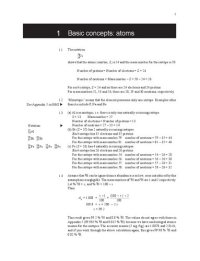
Ebook: Inorganic Chemistry Solutions Manual
Author: Catherine E. Housecroft
Now in its fourth edition, Housecroft & Sharpe's "Inorganic Chemistry" is a well-respected and leading international textbook. "Inorganic Chemistry" is primarily designed to be a student text but is well-received as a reference book for those working in the field of inorganic chemistry.
"Inorganic Chemistry" provides both teachers and students with a clearly written and beautifully-illustrated introduction to core physical-inorganic principles. It introduces the descriptive chemistry of the elements and the role played by inorganic chemistry in our everyday lives. Chapters on catalysis and industrial processes, bioinorganic chemistry, and inorganic materials and nanotechnology include many of the latest advances in these fields. There is a new chapter on experimental techniques, and the large number of worked examples, exercises and end-of-chapter problems illustrate a broad range of their applications in inorganic chemistry. The striking full-colour design includes a wealth of three-dimensional molecular and protein structures and photographs, enticing students to delve into the world of inorganic chemistry.
Throughout its four editions, "Inorganic Chemistry" has successfully given both teachers and students the tools with which to approach the subject confidently and with enjoyment. Environmental issues linked to inorganic chemistry, topics relating inorganic chemistry to biology and medicine, and the applications of inorganic chemicals in the laboratory, industry and daily life form the basis of a wide range of topic boxes in the book, helping students to appreciate the importance and relevance of the subject.
A strong pedagogic approach is at the heart of "Inorganic Chemistry." While worked examples take students through calculations and exercises step by step, the sets of self-study exercises and end-of-chapter problems reinforce learning and develop subject knowledge and skills. The end-of-chapter problems include sets of 'overview problems', and problems entitled 'inorganic chemistry matters' which use everyday material to illustrate the relevance of the material in each chapter. Definitions panels and end-of-chapter checklists offer students excellent revision aids. Further reading suggestions, from topical articles to recent literature papers, encourage students to explore topics in more depth.
"Inorganic Chemistry" provides both teachers and students with a clearly written and beautifully-illustrated introduction to core physical-inorganic principles. It introduces the descriptive chemistry of the elements and the role played by inorganic chemistry in our everyday lives. Chapters on catalysis and industrial processes, bioinorganic chemistry, and inorganic materials and nanotechnology include many of the latest advances in these fields. There is a new chapter on experimental techniques, and the large number of worked examples, exercises and end-of-chapter problems illustrate a broad range of their applications in inorganic chemistry. The striking full-colour design includes a wealth of three-dimensional molecular and protein structures and photographs, enticing students to delve into the world of inorganic chemistry.
Throughout its four editions, "Inorganic Chemistry" has successfully given both teachers and students the tools with which to approach the subject confidently and with enjoyment. Environmental issues linked to inorganic chemistry, topics relating inorganic chemistry to biology and medicine, and the applications of inorganic chemicals in the laboratory, industry and daily life form the basis of a wide range of topic boxes in the book, helping students to appreciate the importance and relevance of the subject.
A strong pedagogic approach is at the heart of "Inorganic Chemistry." While worked examples take students through calculations and exercises step by step, the sets of self-study exercises and end-of-chapter problems reinforce learning and develop subject knowledge and skills. The end-of-chapter problems include sets of 'overview problems', and problems entitled 'inorganic chemistry matters' which use everyday material to illustrate the relevance of the material in each chapter. Definitions panels and end-of-chapter checklists offer students excellent revision aids. Further reading suggestions, from topical articles to recent literature papers, encourage students to explore topics in more depth.
Download the book Inorganic Chemistry Solutions Manual for free or read online
Continue reading on any device:

Last viewed books
Related books
{related-news}
Comments (0)